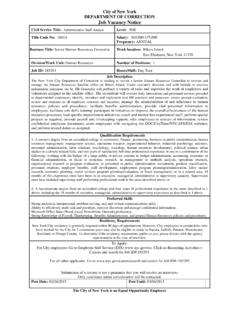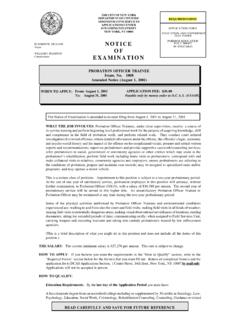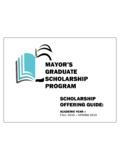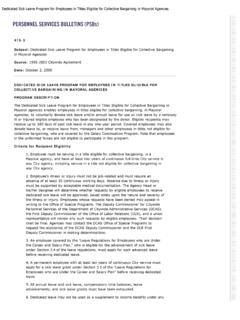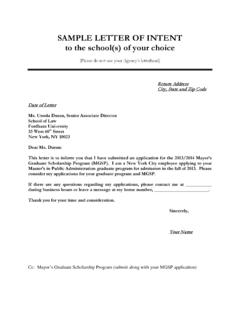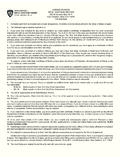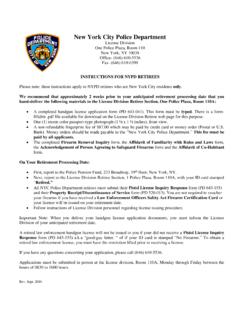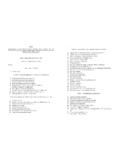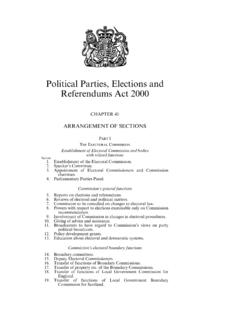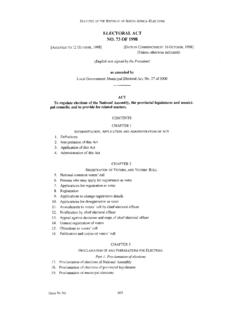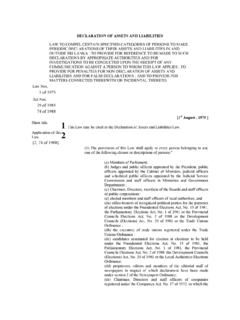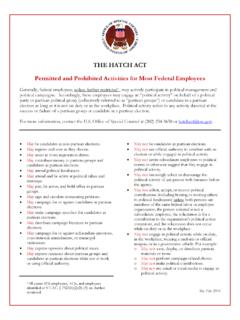Transcription of Applicability of the Hatch Act to Municipal Offi cers …
1 Applicability of the Hatch Act to Municipal Officers and Employees By Sung Mo Kim Municipal officers and the OSC issues advisory opinions to persons seeking employees in New York guidance about political activity under the Hatch Act, State, like all citizens, are including Municipal officers and employees to whom encouraged to participate in the Act might apply. the political process. How- ever, because Municipal To Whom Does It Apply? officials are vested with the The key to understanding the Hatch Act is to public's trust, they have the know to whom it applies. Therefore, before Municipal responsibility to ensure that officials determine what political activity they are pro- their political activity does hibited from participating in under the Hatch Act, they not compromise that trust. In must first find out whether they are even subject to the particular, Municipal officers restrictions imposed by the Act. and employees must comply with certain laws that were enacted to ensure that the public maintains its trust in government.
2 Such laws may be either state, local, or even federal. Although The Hatch Act, like many state Article 18 of the General Municipal Law, the state law and local laws that restrict a public regulating Municipal conflicts of interest, contains no servant's political activity, was restrictions on political activity, some local codes of enacted to ensure that the influence ethics Moreover, many Municipal public servants are also subject to the federal Hatch Act, a fact that they of partisan politics in government may not know or may not clearly understand. This ar- institutions was limited and to protect ticle will attempt to outline some of the important pro- public servants from perceived visions of the Hatch Act of which Municipal employees pressure from political parties to work should be aware. on political campaigns or give political What Is the Hatch Act? contributions.. The Hatch Act is federal legislation that restricts the political activity of certain government employees.
3 While the Hatch Act is a federal law, it applies not The Hatch Act, like many state and local laws that re- only to individuals employed by an agency in the fed- strict a public servant's political activity, was enacted to eral executive branch2 but also to individuals princi- ensure that the influence of partisan politics in govern- ment institutions was limited and to protect public ser- pally employed3 by state, county, or Municipal execu- tive agencies in connection with programs financed in vants from perceived pressure from political parties to whole or in part by loans or grants made by the United work on political campaigns or give political contribu- States or a federal tions. The common perception is that partisan politics'. influence in government institutions and on Municipal To determine whether he or she is subject to the employees leads to ineffective, inefficient, and partial Hatch Act, a Municipal employee must assess whether government institutions.
4 The provisions of the Hatch he or she performs duties in connection with a pro- Act, which are primarily concerned with candidacy or gram financed by federal monies. State and local pro- support for candidates in partisan elections, attempt to grams that typically receive federal funding include, ensure that the government institutions' impartiality for example, public welfare, housing, transportation, and integrity are not compromised. and law enforcement. If a Municipal employee per- forms duties in connection with an activity financed in How Is It Administered? whole or in part by a federal loan or grant, it will not The Hatch Act is administered by the United States matter that he or she receives his or her salary from Office of Special Counsel (the OSC ), an independent non-federal monies; that he or she has no authority federal body that, in addition to the Hatch Act, ad- or discretion on how those federal funds are spent; or ministers two other federal statutes, the Civil Service that the federal monies fund only a small portion of Reform Act and the Whistleblower Protection Act.
5 In the program; he or she will be subject to the Hatch Act. its efforts to promote compliance with the Hatch Act, Furthermore, if a Municipal employee is subject to the NYSBA/MLRC Municipal Lawyer | Fall 2006 | Vol. 20 | No. 4 15. Hatch Act, he or she will continue to be covered by as described above, it does not prohibit Municipal the Hatch Act even when he or she is on annual leave, employees from: (1) running as a candidate for public sick leave, leave without pay, or administrative leave. office in nonpartisan elections, that is, elections where Therefore, an employee running for office in a partisan candidates are running with no party affiliation; (2). election may not avoid the requirements of the Hatch holding elective office in political parties, clubs, and Act by taking a leave of absence. organizations; (3) campaigning for candidates for public office in partisan and nonpartisan elections; (4). In addition, the Hatch Act can apply even to contributing money to political organizations; and (5).
6 Employees of a private, not-for-profit organization if attending and giving a speech at a political fundraiser, it receives federal funding and if federal legislation rally, or other than the Hatch Act contains a provision that the recipient not-for-profit should be treated as a state What Happens When a Violation Occurs? or local agency for the purposes of the Act, such as, for example, the Head Start Program5 or Community When a Municipal employee who is subject to the Service Block Hatch Act violates the Act by, for example, running for office in a partisan election, he or she could be subject The Hatch Act, however, does not apply to to prosecution by the OSC. Municipal employees who exercise no functions in connection with an activity financed in whole or in The OSC has not only an advisory function, as part by federal loans or grants. Nor does it apply to discussed above, but also investigative and prosecuto- individuals employed by an educational or research rial functions; thus, the OSC is charged not only with institution, establishment, agency, or system which is interpreting the Hatch Act but also with enforcing supported in whole or in part by a state or political violations of the Act.
7 Complaints alleging violations subdivision thereof (officers and employees of school of the Hatch Act can be made to the OSC, which will districts that are supported by state funds are thus then investigate the allegation to determine whether not subject to the Act), or by a recognized religious, the evidence and facts warrant prosecution before the philanthropic, or cultural Note also that Merits Systems Protection Board (the MSPB ), an the Act does not apply to employees of the legislative independent quasi-judicial agency that is authorized or judicial branches. to adjudicate Hatch Act violations brought by the OSC. Alternatively, when the severity of the violation does Needless to say, any Municipal employee who not warrant prosecution, that is, when the violation is works in a program receiving any federal funding not sufficiently egregious, the OSC may issue a warn- should check to see whether he or she is covered by ing letter to the employee involved. the Hatch Act.
8 When an alleged violation is prosecuted before What Activities Does It Prohibit? the MSPB, the employee and the state or local agency employing him or her are entitled to be represented by Once a Municipal officer or employee determines After a hearing, the MSPB must determine that he or she is subject to the Hatch Act, he or she whether a violation of the Hatch Act occurred and, if must know what political activities the Hatch Act so, whether such violation warrants the dismissal of prohibits. The Hatch Act prohibits those Municipal the If the MSPB finds that the violation officials subject to its provisions from, among other warrants dismissal from employment, the employing things: (1) using their official authority or influence for agency must either remove the employee or forfeit a the purpose of interfering with or affecting the result portion of the federal assistance equal to two years'. of an election or nomination for office; (2) directly or salary of the If the MSPB finds that the indirectly coercing, attempting to coerce, command- violation does not warrant the employee 's removal, no ing, or advising a state or local employee to pay, lend, penalty is imposed.
9 Or contribute anything of value to a party, committee, organization, agency, or person for political purposes; Closing Remarks and (3) running as a candidate for public office in a partisan election, that is, in an election in which any A Municipal employee who has questions about candidate represents, for example, the Democratic or the Hatch Act is not left without help to interpret Republican As described earlier, these restric- the Act's provisions. As described above, the OSC is tions are primarily concerned with candidacy or sup- available to provide advice and guidance to Municipal port for candidates in partisan elections. employees about political activity under the Hatch Act. The easiest way to learn more about the Hatch Act and to stay clear of any violations of the Hatch Act is to What Activities Are Permissible? seek the OSC's advice. While the Hatch Act prohibits some conduct by Municipal employees concerning partisan elections, 16 NYSBA/MLRC Municipal Lawyer | Fall 2006 | Vol.
10 20 | No. 4. Additional information on the Hatch Act, the OSC, 2. See 5 7322(1). and the MSPB can be found on the following website: 3. When a Municipal employee has two or more jobs, his or her principal employment is that employment to which he or she devotes the most time, and from which he or she derives the Finally, one should emphasize that Municipal em- most income. See Smyth v. Civil Service Commission, 291 F. Supp. 568 ( Wis. 1968). ployees who wish to be politically active may also be subject to restrictions imposed by their local Municipal 4. See 5 1501(4). laws. The Hatch Act does not supersede nor negate the 5. See 42 9851. need to comply with additional restrictions imposed 6. See 42 9918. on Municipal employees by their respective munici- 7. See 5 1501(4)(a) and (b). pal laws. In New York City, for example, the political 8. See 5 1502(a)(1) (a)(3). activity of a City public servant whose duties are in 9. See 5 (a) and (e) and (f). connection with a federally funded program must 10.
